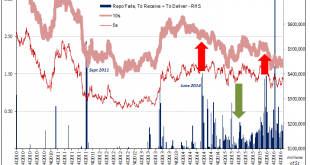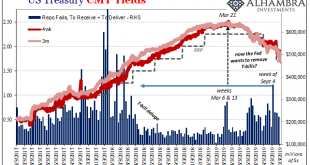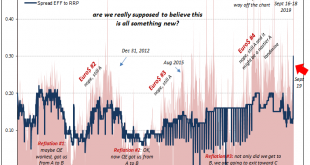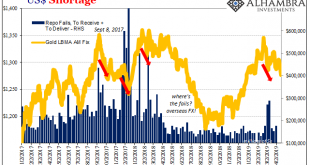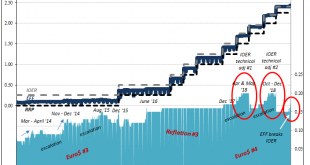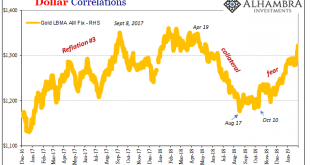There it was sticking out like a sore thumb right in the middle of what should have been the glory year. Everything seemed to be going just right for once, success so close you could almost feel it. Well, “they” could. The year was 2014 and the unemployment rate in the US was tumbling, the result of the “best jobs market in decades.” Real GDP in that year’s two middle quarters was pretty near 5% in both. What wasn’t to like? As GDP-measured output was spiking, so,...
Read More »Never Attribute To Malice What Is Easily Explained By Those Attributing Anything To Term Premiums
There will be more opportunities ahead to talk about the not-QE, non-LSAP which as of today still doesn’t have a catchy title. In other words, don’t call it a QE because a QE is an LSAP not an SSAP. The former is a large scale asset purchase plan intended on stimulating the financial system therefore economy. That’s what it intends to do, leaving the issue of what it actually does an open question. The SSAP is what’s coming next. A small scale asset purchase plan...
Read More »What’s The Verdict On This Week?
Jay Powell’s disastrous week is coming to a close, not yet his long nightmare. He has been battling fed funds (meaning repo) for his entire tenure dating back to February 2018. This week wasn’t the conclusion to the contest, just the latest and biggest round of it. According to DTCC, the GC repo (UST) rate came back down to 1.975% today. That’s much less than the 3.000% yesterday and 6.007% on Tuesday. As yesterday, today’s unscheduled overnight repo operation...
Read More »Climate Risk, Credit Risk, and ECB Collateral
In a CEP Discussion Note, Pierre Monnin argues that financial markets mis-price climate related credit risk. If this were corrected some securities held by the ECB would loose their investment grade credit rating. Assessing climate risks requires methodologies based on forward-looking scenarios, on complex cause-and-effect linkages and on data that has not been observed in the past. Such models are at their infancy, but already offer meaningful insights. This note provides an overview of...
Read More »Climate Risk, Credit Risk, and ECB Collateral
In a CEP Discussion Note, Pierre Monnin argues that financial markets mis-price climate related credit risk. If this were corrected some securities held by the ECB would loose their investment grade credit rating. Assessing climate risks requires methodologies based on forward-looking scenarios, on complex cause-and-effect linkages and on data that has not been observed in the past. Such models are at their infancy, but already offer meaningful insights. This note provides an overview of...
Read More »COT Blue: Distinct Lack of Green But A Lot That’s Gold
Gold, in my worldview, can be a “heads I win, tails you lose” proposition. If it goes up, that’s fear. Nothing good. If it goes down, that’s collateral. In many ways, worse. Either way, it is only bad, right? Not always. There are times when rising gold signals inflation, more properly reflation perceptions. Determining which is which is the real challenge. Corroboration and consistency are paramount. Gold had been...
Read More »Phugoid Dollar Funding
On August 12, 1985, Japan Airways flight 123 left Tokyo’s Haneda Airport on its way to a scheduled arrival in Osaka. Twelve minutes into the flight, the aircraft, a Boeing 747, suffered catastrophic failure when an aft pressure bulkhead burst. The airplane had been improperly repaired from a tailstrike (the tail of the aircraft actually hitting the runway pavement) seven years earlier, and therefore wasn’t sufficiently...
Read More »Fed Balance Sheet Policy and Collateral
On his blog, Stephen Williamson discusses the Fed’s plan to maintain a much larger balance sheet in the future than before the crisis. He is not convinced that this plan is a good one. But what’s the harm in a large Fed balance sheet? The larger the balance sheet, the lower is the quantity of Treasury securities in financial markets, and the higher is reserves. Treasuries are highly liquid, widely-traded securities that play a key role in overnight repo markets. Reserves are highly liquid...
Read More »Fed Balance Sheet Policy and Collateral
On his blog, Stephen Williamson discusses the Fed’s plan to maintain a much larger balance sheet in the future than before the crisis. He is not convinced that this plan is a good one. But what’s the harm in a large Fed balance sheet? The larger the balance sheet, the lower is the quantity of Treasury securities in financial markets, and the higher is reserves. Treasuries are highly liquid, widely-traded securities that play a key role in overnight repo markets. Reserves are highly liquid...
Read More »Fear Or Reflation Gold?
Gold is on fire, but why is it on fire? When the precious metals’ price falls, Stage 2, we have a pretty good idea what that means (collateral). But when it goes the other way, reflation or fear of deflation? Stage 1 or Stage 3? If it is Stage 1 reflation based on something like the Fed’s turnaround, then we would expect to find US$ markets trading in exactly the same way. Like 2017, when gold was last rising, there...
Read More » Swiss Economicblogs.org
Swiss Economicblogs.org

